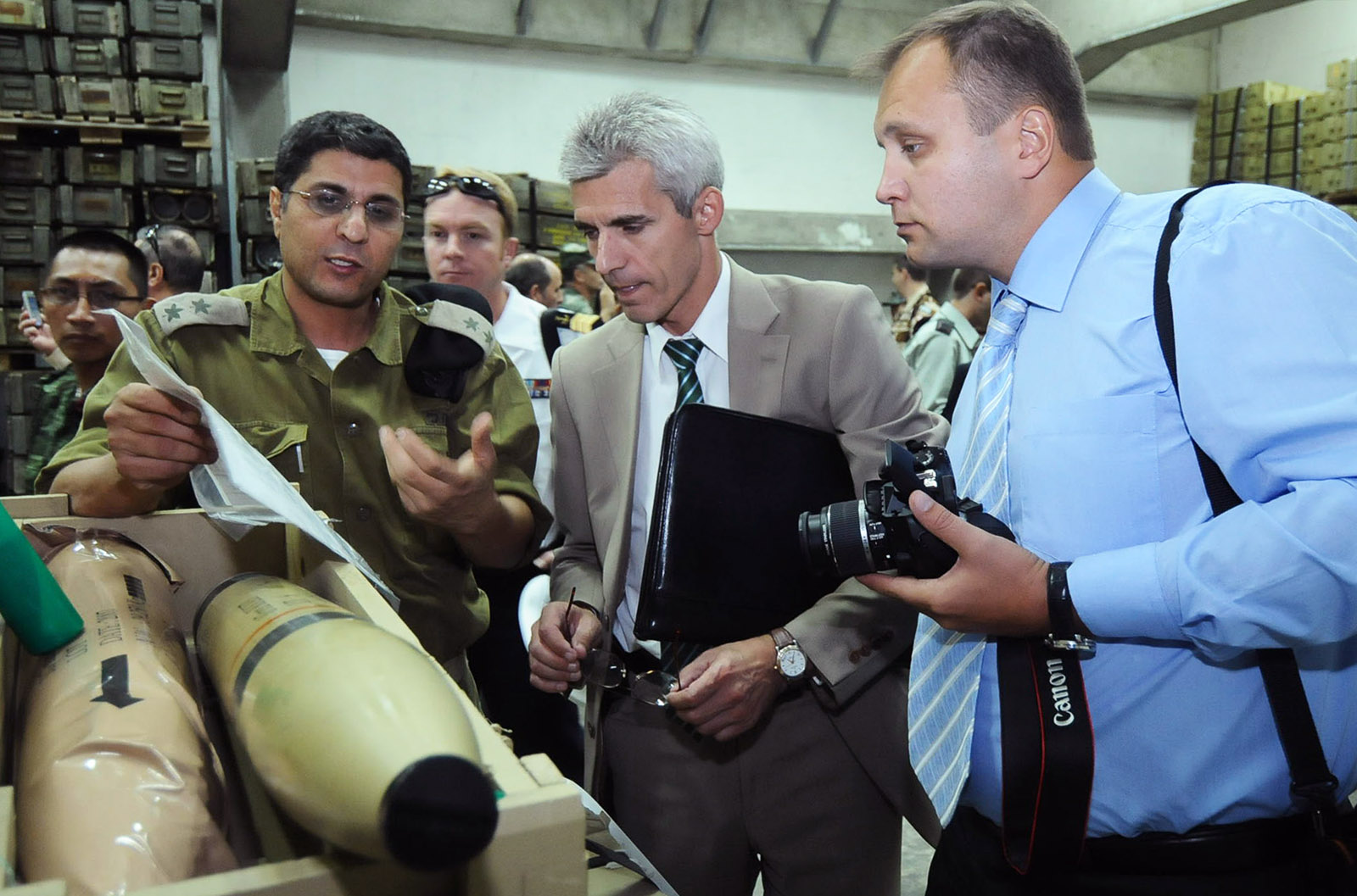Shani Shahmoon: Iran nuclear deal poses threat to Israel, stability in Middle East

Ambassadors, diplomats, and military attaches from several countries visited an Israel Defense Forces base to examine weapons intercepted by the Israel Navy Forces. (Creative Commons photo by Israel Defense Forces via Flickr)
By Shani Shahmoon
Aug. 10, 2015 12:01 p.m.
Supporters of the Iran nuclear deal should realize what they see as a step forward for world peace might be three steps backward for stability in the Middle East.
I have been sitting in an Israeli news room interning for The Jerusalem Post since early July. On a daily basis since the Iran nuclear deal was released to the public in mid-July, countless articles and columns surrounding the numerous perspectives on the deal have been published. While Israeli perspectives differ in semantics, the majority conclusion is that the faults within the Iran deal are a huge risk to Israel’s safety.
The deal’s critics view Iran’s consistent funding of terrorist organizations as a flashing red light that needs to be addressed when dealing with the lifting of sanctions and spreading of nuclear weapons in the constantly chaotic region. Iran has been linked to both Hamas and Hezbollah – two historic antagonists of Israel’s safety. There have also been allegations that Iran is funding even more groups against the United States and Israel.
Because of its numerous ambiguities, the deal allows Iran to benefit from a diplomatic relationship with the United States without being held accountable for funding terrorist organizations that threaten not only Israel, but the rest of the Middle East.
While this deal can potentially mend the United States and Iran’s nearly nonexistent relationship, it doesn’t acknowledge its effects on Israel, a country that neighbors all of the terrorist organizations funded by Iran, as well as a consistent ally to America throughout the years. As an Israeli student at UCLA, this blind spot is one of the most concerning things when it comes to deciding my support for such an agreement.
Terrorist organizations funded by Iran have continually addressed their lack of respect and want to destroy the state of Israel. Having Hamas in the south and Hezbollah in the north, two terrorist organizations funded by Iran, puts Israel at an intense risk. Most Israelis see this Iran deal as a hindrance to their safety.
Even Israel’s opposition to the current conservative government, headed by Benjamin Netanyahu, sees the deal as detrimental.
Despite facing economic sanctions, Iran has funded Hamas to an extent that hundreds of terror tunnels have been built from Gaza into Israel and rockets that can reach up to central Israel have been obtained. By lifting sanctions, Iran’s funding of these terrorist organizations can increase, and therefore lead to what could be another major war between Israel and Hamas, something that both Palestinians and Israelis do not want.
Although there is a probability that with the lifting of economic sanctions without regulating the allocations of funding, Iran will be able to re-energize and recreate its fallen economy, there is also a high probability that terrorist organizations in the Middle East will not only continue to receive government support, but will also grow stronger and hinder peace talks among the region.
Additionally, Iran has agreed to provide the International Atomic Energy Agency with more information about its nuclear program as a part of the deal, but inspections ensuring the information provided is accurate must be announced 24 days in advance.
While there is debate on whether the government would be able to hide any illegal nuclear weapons within 24 days, it is unreasonable to include a caveat that potentially undermines the purpose of the deal, especially when the deal puts the region and an ally at risk.
In a speech defending the deal Wednesday, President Obama said, “The choice we face is ultimately between diplomacy and some form of war.” And he may be right – there are in fact some good parts to the deal, and it does make it harder for Iran to build a bomb.
Yet while President Obama may be correct that no deal could lead to more violence, he is denying the constant threat of violence in the region that America is distant from. There is little imminent threat to America if the deal ensues, but it is Israel who will face the backlash of Iran’s new economic freedom.
Supporters of the deal have argued that demanding transparency and de-escalation from Iran’s nuclear program better serves the greater good. However, the procedures outlined in the plan are not strong enough to guarantee progress.
Many of Iran’s actions in the region are condemnable, and ignoring the fact that the government supports terrorist organizations is unfair.
Iran has not, in the last few decades, proved itself to be a reliable counterpart in a cautionary and dangerous deal. This statement is not in regards to its people, but to its government. To put this exuberant amount of trust in it seems illogical in the eyes of Israelis and pro-Israel supporters, as well as in proponents of peace in the region.
From the perspective of the United States, there’s a decent amount to like about the deal. But an agreement this large has massive, sprawling implications for the entire globe – and from the perspectives of Israelis, the world just got a little darker.

